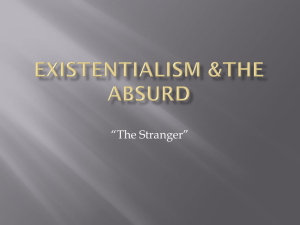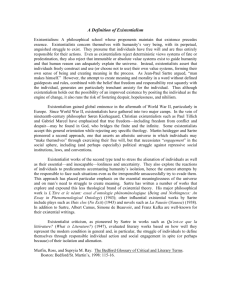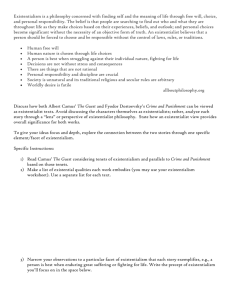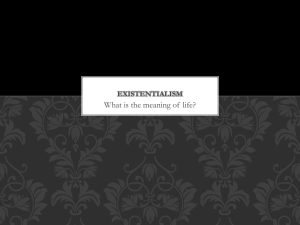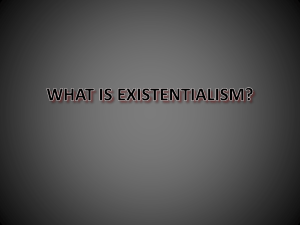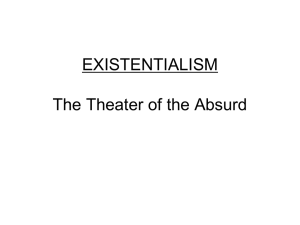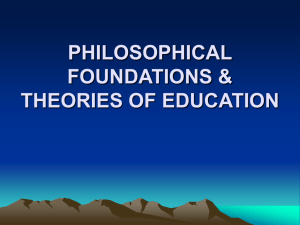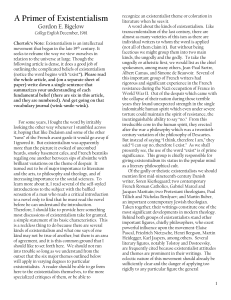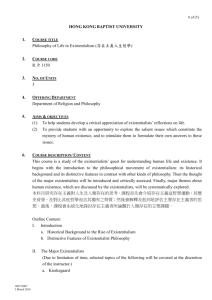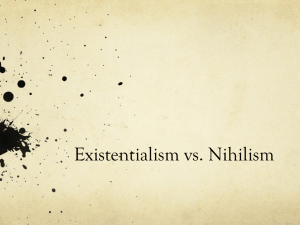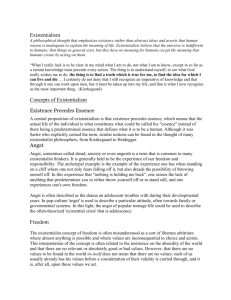Ways to Answer The Big Question Part II: Existentialism
advertisement
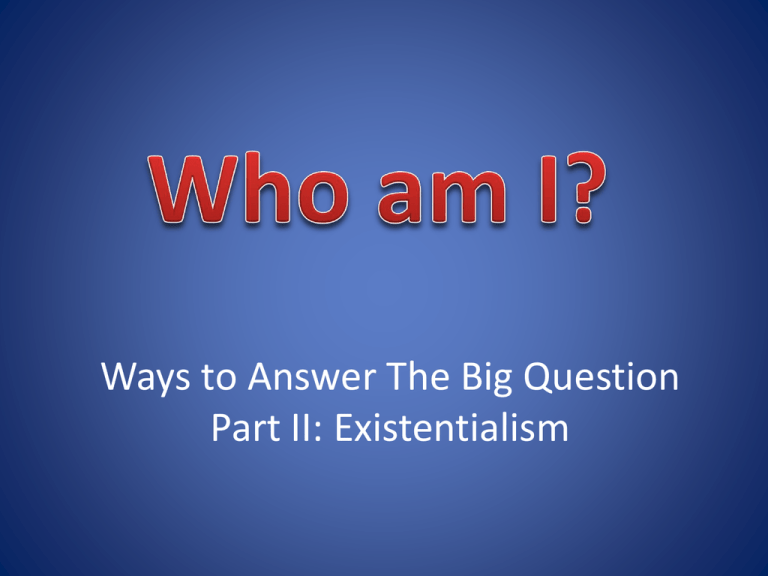
Ways to Answer The Big Question Part II: Existentialism • The Big Question this semester has been “Who am I?” So far, we’ve seen how the Naturalist writers (Tolstoy, Maupassant, and Ibsen) answer this question, and we’ve begun to see how we can answer this question for ourselves. – Review: How did the Naturalist writers answer this question? What, according to them, gave meaning or purpose to life? What is Existentialism? • Existentialism is a 20th century philosophy that asks what it means to exist as a human being. • It is concerned with a search for self and the meaning of life through free will, choice, and responsibility. Existentialist thinkers believe that people are searching to find out who and what they are as they make choices based on their experiences, beliefs, and outlook. – Discuss: How does this relate to Nora’s decision to leave Torvald in A Doll’s House? What is Existentialism? • Existentialists reject the idea of truth as an external idea. Each individual’s version of truth is different. • Existentialists value each individual’s free will, believing that values, rules, and morals imposed from the outside effectively negate the individual’s existence. So I can basically do whatever I want, right? Existentialism: Not Existentialism • Human free will • Human nature is chosen through life choices. • A person is at his or her best when struggling against him or herself. • Decisions are not without stress and consequences. • There are things that are not rational. • Personal responsibility and discipline are crucial. • Society is unnatural and its traditional religious and secular rules are abitrary. • Worldly desire is futile. • Wealth, pleasure, or honor make the good life. • Society’s values or structure control the individual. • All you can do is accept things the way they are. • Science can and will make everything better. • People are basically good but are ruined by society or other external forces. • “I want my way, now!” or “It’s not my fault” thinking Existentialist Writers • Unlike other literary movements, Existentialist writers did not identify themselves, did not believe they were part of a movement or trend, and often did not agree on matters of politics, religion, or philosophy. • Being part of a “movement” cancels out the idea of the individual that is so important to Existential thought. Existentialist Writers • Soren Kierkergaard was primarily a religious philosopher who regarded his writing as a kind of spiritual exploration. • Frederich Nietzsche was an ardent atheist and “immoralist.” • Albert Camus was a humanitarian, Jean-Paul Sartre a Marxist, and Martin Heidegger was a Nazi. • None of these writers would have gotten along well given their wildly different beliefs. Each was truly eccentric and took individuality in a different direction. EXISTENTIAL THEMES ABSURDITY • For the existentialists, life is absurd; it makes no sense and has no meaning or ultimate purpose, but human beings need it to make sense, to have meaning and purpose. REJECTION OF MEANING-GIVING NARRATIVES • It isn’t enough to say that life is absurd or without meaning; existentialists repeatedly make the point that any attempt made by philosophy, religion, or science to explain or make sense of life, they always fail. • Existentialists believe this kind of meaningmaking isn’t just false; it is dangerous because it keeps people from examining their own choices and exercising their own free will. ALIENATION • This is the feeling that you’re a stranger in your own life, or a stranger in the world. • Because existentialists believed that the individual determined his or her own reality, these realities didn’t intersect, and connections between people become difficult or impossible. • No one can help you make sense of your own existence. ANXIETY / ANGST • This is the feeling of unease or unrest when you realize that life is absurd and you are alone at the center of your own universe. • Because who you are is determined by the choices you make, decision-making can cause worry and indecision. RESPONSIBILITY • Everyone bears responsibility for themselves. If there is no guidebook, as the existentialists believed, each person is responsible for making his or her way through it and for creating some kind of meaning for it. • Because your decisions are what makes you who you are, you are responsible for the outcomes of these decisions. AUTHENTICITY • According to the existentialists, people want authenticity—to live in a way that is in tune with the truth of who they are as human beings. • The goal of life, they believed, is to be the most “you” that you can. INDIVIDUALITY • An important part of developing an authentic and satisfying life is individuality. Reason, science, and systems that try to cover up the absurdity of life often take individuality from you. • It is up to each person to decide what is right or wrong, determine how to act in a way that affirms one’s identity, and accept the consequences for his or her actions. PASSION • Being passionate or engaged is an important part of living an authentic life, and it’s under attack from the same forces that take away your individuality. • Passion comes from acting in a way that is true to your core beliefs; if you get your beliefs from an external source, you are not acting passionately. DEATH • This is the ultimate context for all human actions. In other words, everything we do, we do because one day we will die. • This is an important source for the absurdity of life. Core Beliefs of Existentialism • The most important struggle comes from within a person. • A person’s identity comes from his or her internal struggle. • Each person is solely responsible for giving his or her life meaning. • Every person is entirely responsible for his or her own actions. • It’s impossible for people to make meaningful connections with each other. • Perception defines reality. Things are the way a person believes they are. Assignment: Existentialism Acrostic E X I S T E N T I A L I S M
